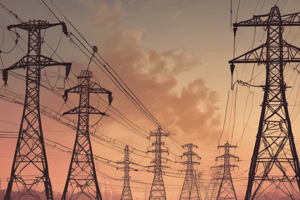Podcast
Questions and Answers
विद्युत ग्रिड में वोल्टेज स्तरों को नियंत्रित करने के लिए कौन से उपकरणों का उपयोग किया जाता है, और ये उपकरण कैसे काम करते हैं?
विद्युत ग्रिड में वोल्टेज स्तरों को नियंत्रित करने के लिए कौन से उपकरणों का उपयोग किया जाता है, और ये उपकरण कैसे काम करते हैं?
विद्युत ग्रिड में वोल्टेज स्तरों को नियंत्रित करने के लिए ट्रांसफार्मर, रेगुलेटर और कंडक्टर का उपयोग किया जाता है. ट्रांसफार्मर वोल्टेज को बढ़ाने या घटाने के लिए उपयोग किए जाते हैं, जबकि रेगुलेटर वोल्टेज में छोटे बदलावों को नियंत्रित करने के लिए उपयोग किए जाते हैं. कंडक्टर का उपयोग बिजली को एक बिंदु से दूसरे बिंदु तक ले जाने के लिए किया जाता है.
एक इलेक्ट्रीशियन के रूप में, सुरक्षित कार्य करने के लिए क्या महत्वपूर्ण सुरक्षा सावधानियाँ हैं?
एक इलेक्ट्रीशियन के रूप में, सुरक्षित कार्य करने के लिए क्या महत्वपूर्ण सुरक्षा सावधानियाँ हैं?
सुरक्षित कार्य करने के लिए, एक इलेक्ट्रीशियन को हमेशा लाइव वायर से सावधानी बरतनी चाहिए, सुरक्षात्मक उपकरण जैसे दस्ताने और चश्मे का उपयोग करना चाहिए, और किसी भी कार्य को शुरू करने से पहले ऊर्जा को बंद कर देना चाहिए.
विद्युत ग्रिड में ट्रांसफार्मर का क्या कार्य है?
विद्युत ग्रिड में ट्रांसफार्मर का क्या कार्य है?
विद्युत ग्रिड में, ट्रांसफार्मर का उपयोग वोल्टेज स्तरों को बदलने के लिए किया जाता है. वे विद्युत ऊर्जा को उच्च वोल्टेज से कम वोल्टेज में या कम वोल्टेज से उच्च वोल्टेज में बदल सकते हैं.
एक इलेक्ट्रीशियन विद्युत उपकरणों के लिए विभिन्न प्रकार के वायरिंग सिस्टम का उपयोग कैसे कर सकता है, और इन सिस्टमों के बीच अंतर क्या हैं?
एक इलेक्ट्रीशियन विद्युत उपकरणों के लिए विभिन्न प्रकार के वायरिंग सिस्टम का उपयोग कैसे कर सकता है, और इन सिस्टमों के बीच अंतर क्या हैं?
विद्युत सुरक्षा उपकरणों के कुछ उदाहरण दें, और उनके कार्य बताएं.
विद्युत सुरक्षा उपकरणों के कुछ उदाहरण दें, और उनके कार्य बताएं.
Flashcards
ITI इलेक्ट्रिशियन थ्योरी
ITI इलेक्ट्रिशियन थ्योरी
ITI इलेक्ट्रिशियन पाठ्यक्रम का सिद्धांत जो बिजली से संबंधित है।
विद्युत ग्रिड
विद्युत ग्रिड
एक नेटवर्क जो बिजली का उत्पादन, ट्रांसमिशन और वितरण करता है।
पावर सिस्टम
पावर सिस्टम
विभिन्न उपकरणों और चरणों का समूह जो ऊर्जा प्रबंधन के लिए काम करता है।
परखते समय
परखते समय
Signup and view all the flashcards
पिछले पेपर
पिछले पेपर
Signup and view all the flashcards
Study Notes
Introduction to ITI Electrician Theory and Power Grid Previous Papers
- ITI (Industrial Training Institute) electrician examinations often feature questions based on theoretical concepts and practical applications in power grids.
- Previous papers provide valuable insights into the types of questions asked and the significant areas of focus.
- Studying past papers is an effective way to prepare for the exam and helps students identify weak areas.
- It is vital to understand the electrical principles underlying power grids and the different components, including transformers, generators, and transmission lines.
Key Areas in ITI Electrician Theory
-
Basic Electrical Principles: Fundamental concepts like Ohm's Law, Kirchhoff's Laws, and the characteristics of various electrical components (resistors, capacitors, inductors).
-
DC Circuits: Understanding series, parallel, and series-parallel combinations of DC circuit components.
-
AC Circuits: Understanding AC circuit analysis, including single-phase and three-phase systems. Emphasis on sinusoidal waveforms, impedance, and resonance.
-
Transformers: Types of transformers (step-up, step-down), their applications, and basic principles. Importance of voltage, current, and power transformations.
-
Generators and Motors: Understanding the principles of operation, types (DC, AC), and their applications. Key aspects such as torque, speed, and efficiency.
-
Switches and Protection Devices: Types of switches and their importance. Types of protection devices, such as fuses, circuit breakers, and their operation in safety applications.
-
Measuring Instruments: Using and interpreting the readings from different measuring devices like voltmeters, ammeters, and multimeters. Knowledge of measuring different parameters and ensuring accuracy.
-
Power Grids: Concepts of generation, transmission, and distribution of electrical power.
-
Electrical Machines: Different types of electrical motors and generators, their applications, and specifications.
Power Grid Components and Concepts
-
Generation: Knowledge of various power generation methods like thermal, hydro, nuclear, solar, wind. Understanding different generation units and their characteristics. Emphasizing the need for reliable power generation sources and efficient energy use.
-
Transmission: Power transmission lines, insulators, voltage levels (high, medium, low), and the necessity of high voltages for efficient power transmission. Studying the infrastructure and principles behind the transmission process.
-
Distribution: Distribution transformers, feeders, and the roles of transformers to step down voltage for consumer use. Emphasis on safety and efficient distribution networks.
-
Protection Systems: Safety and preventative measures including circuit breakers, fuses, earthing, and their role in protecting the power grid. Understanding the criticality of safety measures to prevent unwanted incidents.
Study Tips for Previous Papers
- Analyze Past Papers: Identify recurring topics, types of questions, and question difficulty.
- Focus on Weak Areas: Pinpoint areas where performance was below expectations and concentrate on mastering those aspects.
- Understand Concepts: Focus on comprehension rather than rote memorization. Deep understanding of the underlying electrical principles leads to better problem-solving.
- Practice, Practice, Practice: Solve as many previous papers as possible to boost confidence and improve your accuracy.
- Review Solutions: Thoroughly examine the solutions to problems, especially those where mistakes were made, to fully understand the concepts.
- Time Management: Practice time management during test preparation to ensure you can solve questions within the allotted time. This is crucial for completing the exam successfully.
- Familiarize yourself with Electrical Diagrams and Circuit Schematics: Many questions will involve representing and analyzing circuits, including components like resistors, capacitors, inductors, etc. Understanding how to read and interpret these diagrams is important.
Important Considerations for ITI Electricians
- Safety Precautions: Following proper safety procedures and precautions during electrical work is crucial. Understanding safety measures for handling electricity is fundamental to ensuring safety.
- Troubleshooting and Repair: Proficiency in identifying and rectifying problems in electrical systems accurately. Students should gain the knowledge and practice to handle potential issues in installations.
- Practical Applications: Practical application of concepts and knowledge is vital. It is often beneficial to test these aspects through hands-on work.
Conclusion
- Consistent preparation with an emphasis on comprehensive study, analyzing past papers, and applying concepts is essential for success in ITI Electrician examinations.
- Building a strong foundation in fundamental electrical principles and understanding the power grid components is key to success.
- Emphasizing safety measures and practical troubleshooting abilities can lead significantly to success in the field.
Studying That Suits You
Use AI to generate personalized quizzes and flashcards to suit your learning preferences.





